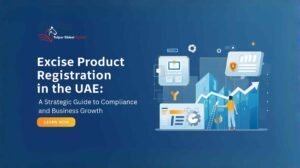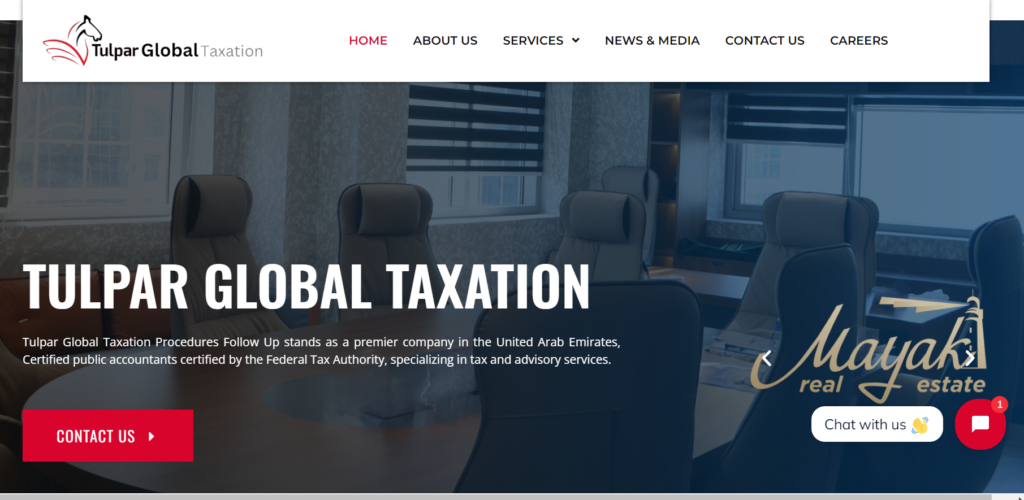
How to Prepare for a Tax Audit in UAE: Key Steps and Best Practices
Table of Contents
Related Articles


Sugar Tax Reform Will Crush Small UAE Drink Brands

The Impact of CARF on UAE Crypto Traders | Ready to Report FTA

Let's Talk
Sign Up For Free Consultation
The Crucial Role of Tax Audit Preparation
In UAE’s ever-changing financial scene, tax audits are an essential tool for guaranteeing regulatory compliance. Whether you are an individual or a corporate entity, it is crucial to prepare adequately for a tax audit. The tax audit process involves a thorough examination of your financial statements, financial records, and tax returns by the Federal Tax Authority (FTA) or other relevant authorities. This scrutiny ensures that all financial documents are in order and that your business activities align with applicable regulations. Being well-prepared can significantly reduce anxiety and minimize potential issues during the audit, providing you with peace of mind.

Understanding the importance of internal controls is vital when gearing up for a tax audit. Strong internal audit practices can help maintain accurate financial records and identify any discrepancies in your financial transactions before they become problematic. An audit firm can offer expert guidance on establishing effective internal controls that will not only streamline the audit process but also bolster your tax position. Ensuring that you have proper records can significantly enhance your auditing experience, making it more efficient and less stressful.
After the tax audit, the audit report will detail the audit findings and any areas requiring attention. The insights gained from the audit can help you refine your processes and strengthen your financial position moving forward. Whether it’s preparing for a VAT audit, responding to external audits, or filing a corporate tax return, the expertise of a seasoned tax auditor is invaluable. This guide provides a thorough rundown of the necessary actions and recommended procedures to assist you in adequately preparing for a UAE tax audit, ensuring that you are equipped to navigate the complexities of the auditing landscape successfully.
Why Is Tax Audit Preparation So Important?
It is impossible to exaggerate how crucial it is to prepare well for a tax audit. The results of an auditing process can have a major effect on your financial situation and productivity. This is why getting ready is crucial:
- Avoiding Financial Penalties: A thorough audit can uncover discrepancies or errors in your tax records, leading to potential fines or penalties. Proper preparation minimizes the risk of such penalties by ensuring that all your financial practices are accurate and compliant with tax regulations. This includes ensuring that your filing of tax returns is timely and that you have comprehensive documentation ready for review. Adherence to regulations, such as compliance with VAT regulations, is vital in safeguarding against legal issues that can arise from inaccuracies.
- Ensuring Smooth Operations: A systematic approach to preparation helps in reducing the time and resources spent on the audit. Efficient documentation and bookkeeping, including maintaining relevant documents and alternative documents when necessary, streamline the audit process. This organized preparation allows you to focus on your core business activities without unnecessary disruptions. By having an organized income statement and other financial statements on hand, you make the auditing process more manageable for both your team and the professional auditors involved.
- Identifying and Mitigating Risks: Preparing for an audit involves conducting a systematic examination of your financial records, including performing a risk assessment and correcting potential issues before the auditors identify them. This proactive approach helps in mitigating risks associated with cross-border transactions and ensures that your tax strategies are sound. By engaging in a comprehensive review, you not only demonstrate your commitment to transparency but also position yourself for an unbiased assessment of your financial standing. A well-prepared audit can enhance your reputation with the tax authorities and contribute to a more favorable outcome, showcasing your dedication to financial transparency.
- Building a Positive Reputation: Demonstrating a commitment to transparency and regulatory compliance fosters trust with auditors and regulatory authorities. A well-prepared audit can enhance your track record and contribute to a more favorable outcome. In conclusion, a thorough and organized approach to audit preparation plays a crucial role in the success of your business, offering invaluable guidance in navigating the complexities of tax regulations and ensuring that you are well-positioned for future compliance.
Comprehensive Steps to Prepare for a Tax Audit

Preparing for a tax audit requires a systematic approach. Follow these key steps to ensure you are well-prepared for the audit process:
1. Conduct a Thorough Review of Financial Records
- Detailed Examination: Start by going over all of your financial records in detail. Statements of cash flow, balance sheets, income, and other pertinent data are included in this. Make sure that all of your transactions are appropriately categorized and recorded to show the actual state of your personal or corporate finances.
- Account Reconciliation: Reconcile your bank statements with your internal records, including accounts receivable and accounts payable. Investigate and resolve any discrepancies promptly to maintain the accuracy of your financial records.
- Supporting Documentation: Make sure you have all the paperwork required for any financial transactions. This covers contracts, bank statements, invoices, and receipts. In order to support your claims during the audit and validate your tax returns, proper documentation is essential.
- Internal Audit: Conduct an internal audit to review your financial records and This self-assessment helps in identifying any gaps or inconsistencies in your documentation and financial practices.
2. Organize and Maintain Records Systematically
- Effective Filing System: Establishing an efficient filing system is crucial for successful business operations. Utilize digital systems or folders to systematically organize your documents, ensuring compliance with tax laws set by the Federal Tax Authority. Sort papers according to type, date, and importance to guarantee that they can be quickly retrieved when needed. A well-organized filing system reduces time spent searching for documents and increases efficiency, allowing you to focus on making informed decisions. Implementing this proactive approach not only streamlines your record-keeping but also lays the groundwork for a smooth audit process.
- Regular Backups: To safeguard against potential data loss, regularly back up your financial data. Utilize cloud storage solutions or other secure methods to ensure that your data is safe and easily accessible. Creating backup copies is essential for recovering information in case of technical issues or data corruption. This practice supports your compliance audit efforts by providing a proper audit trail that can be reviewed during the audit period. By maintaining a reliable backup strategy, you can minimize disruptions and confidently manage your tax liability.
- Retention Policies and Digital Tools: Adhere to UAE’s tax regulations regarding the retention of financial records, ensuring you keep documents for the appropriate tax period—generally, records should be kept for at least five years. Familiarize yourself with these requirements to ensure compliance and avoid potential penalties. Moreover, leveraging accounting and record-keeping software can significantly enhance your financial management. These modern software solutions offer features for tracking expenses, managing invoices, and generating reports, making record-keeping more efficient. Consulting a tax advisor for professional guidance can help you navigate these key steps, ensuring that your financial practices align with the requirements of the audit schedule and enhance your overall business performance.
3. Stay Informed About Tax Regulations
- Regulatory Updates: UAE’s tax regulations are subject to frequent changes. Stay informed about the latest tax laws, amendments, and compliance Subscribe to tax newsletters, attend webinars, or consult with tax professionals to keep up with current regulations.
- Compliance Verification: Make sure that the Federal Tax Authority’s (FTA) standards are followed in your tax filings. Verify the completeness and accuracy of your company tax, VAT, and other tax filings. Maintaining compliance aids in preventing inconsistencies throughout the audit.
- Consulting Professionals: As a business owner, it is crucial to engage with a tax advisor or audit specialist to ensure your understanding of tax regulations is accurate and up-to-date. Their professional advice can help you navigate complex regulations that impact various business entities. By consulting with experts, you can gain insights into effective strategies for managing your business processes and maintaining detailed records. This proactive approach will help you address potential issues before they arise, ultimately supporting the growth and compliance of your business.
- Legal Changes: Keep track of any legal changes that may affect your tax This includes changes in tax rates, new tax regulations, or amendments to existing laws that may impact your financial reporting.
4. Prepare and Review Your Tax Filings
- Review Previous Returns: Examine your previous tax returns to ensure that all information is accurate and complete. Make any necessary corrections to address errors or omissions before the audit. Reviewing past returns helps in identifying and rectifying discrepancies, ensuring that your books of accounts and financial accounts reflect a true and fair view. This comprehensive review is essential for maintaining financial accuracy and preparing for a successful audit experience.
- Supporting Documentation for Deductions: Ensure you have proper documentation for all claimed deductions, credits, and exemptions. This includes receipts, invoices, and other supporting evidence relevant to the taxable entity during the relevant tax period. Comprehensive documentation is essential for substantiating your claims during the audit, especially in the event of a random selection by tax authorities. Engaging in tax planning can also help you optimize your tax position and prepare for future tax liabilities, ensuring a seamless audit process. Utilizing professional tax audit services can make the audit process smoother, allowing for prompt responses to any inquiries and ultimately leading to a more successful audit experience.
Correcting Errors: If you identify any errors or discrepancies in your tax filings, correct them promptly. Amend your returns as needed and notify the FTA of any changes. This proactive approach helps in maintaining accuracy and avoiding penalties related to tax evasion. Being prepared with your documents ready and ensuring timely filing will not only help prevent reputational damage but also facilitate a smoother audit process. Engaging legal representatives or tax experts can further enhance your compliance with tax laws, including compliance with VAT laws and Corporate tax compliance.
5. Conduct a Pre-Audit Self-Assessment
- Mock Audits: Conduct mock audits to identify potential issues and areas of This practice helps in addressing weaknesses in your financial records and improving your readiness for the actual audit.
- Internal Controls Review: Evaluate your internal controls and procedures to identify and strengthen any areas that may be vulnerable to scrutiny during the Robust internal controls help in mitigating risks and ensuring compliance.
- Professional Feedback: Seek feedback from a tax professional on your self- Their expertise can provide valuable insights and help you address potential issues before the audit. Professional feedback enhances your preparedness and confidence.
- Audit Readiness Check: Perform an audit readiness check to ensure that all necessary documents and information are in place. This includes verifying that your financial records, tax filings, and supporting documents are complete and accurate.
6. Communicate Effectively with the Auditor
- Cooperation and Transparency: Be accommodating and helpful to the auditor throughout the audit. To ensure an accurate audit process, promptly supply all necessary papers and data. Cooperation and transparency are essential for a seamless audit engagement and help facilitate a good relationship with the auditor. By ensuring adequate audit preparations, you can reduce the likelihood of audit complications and improve the overall audit outcome.
- Clarify Questions: If you have any questions or concerns during the audit proceedings, seek clarification from the auditor. Clear communication can prevent misunderstandings and delays, ensuring that the audit process proceeds efficiently. Addressing audit queries as they arise can help in maintaining audit readiness and aligning with audit standards. This proactive approach aids in tax audits by fostering a better understanding of the audit requirements and ensuring that all necessary documentation meets the audit report requirements.
- Professional Representation: Consider having a tax advisor or legal representative present during the audit. Their expertise can ensure that your interests are well-represented and that you receive professional guidance throughout the audit procedure. Having an audit specialist can aid in tax audit processes, ensuring that there is an adequate audit trail and that all audit requests are met efficiently. After the audit, follow up with the auditor to address any outstanding issues or questions, which will help you gain insights from your audit experiences and clarify any points raised in the audit notification.
Partner with Tulpar Global Taxation for Expert Assistance

In UAE, being ready for a tax audit needs careful planning and execution. Think about partnering with Tulpar Global Taxation for a smooth and stress-free audit experience. Our team of professionals is committed to guiding you through the complexity of tax laws and making sure you are ready for your audit.
Why Choose Tulpar Global Taxation?
- Expertise and Experience: Our team has extensive experience in handling tax audits and ensuring compliance with UAE’s tax regulations. We are well-versed in the intricacies of the auditing processes and adhere to the applicable regulations, allowing us to provide expert guidance tailored to your specific business demands. Our auditing experience ensures that we understand the unique challenges you face in maintaining accurate accounting records for your business assets.
- Personalized Solutions: We offer customized solutions based on your unique business situation. Our personalized approach ensures that you receive the support you need to prepare effectively for your audit and address any concerns specific to your business expenses and accounting practices. We develop an auditing plan that aligns with your goals, facilitating adherence to tax regulations while considering your overall business decisions.
- Efficient and Effective Process: We streamline the audit preparation process to save you time during business days and reduce stress. Our efficient methods help you stay organized and focused on what matters most, ensuring that you maintain accurate and well-documented financial records. With our commitment to Auditing standards, you can trust that your audit process will be thorough and effective.
- Proactive Risk Management: We take a proactive approach to identify and address potential issues before they become problems during the audit. Our goal is to help you achieve a smooth and successful audit experience while minimizing risks and complications. By ensuring that you have adequate tax records, we aim to provide a seamless experience that supports your business objectives.
Contact Us Today
Don’t leave your tax audit preparation to chance. Ensure you are well prepared for your audit by getting in touch with Tulpar Global Taxation for professional assistance. Our professional tax auditors are ready to help you at every stage, offering the expertise you require to confidently navigate the audit process. To arrange a consultation, contact us by phone or through our website. With our knowledge and support, you can effectively manage any administrative issues and address potential non-compliance issues.
Conclusion
Preparing for a tax audit in Dubai – UAE requires meticulous planning, attention to detail, and a comprehensive approach to preparation. By utilizing Tulpar Global Taxation’s expertise and following the essential steps outlined in this guide, you can tackle your audit with confidence. It is vital to ensure the accuracy of VAT returns and maintain well-organized basic documents, including bank statements and accounting transactions, to avoid additional tax liabilities and fines. Implementing advanced software tools and accounting software programs can further streamline your financial record-keeping processes. Contact Tulpar Global Taxation today for expert guidance, and let us work together towards a successful audit experience by establishing a broader compliance strategy that fits your needs.
A tax audit in the UAE is an official review conducted by the Federal Tax Authority (FTA) to verify compliance with VAT, Corporate Tax, or Excise Tax laws. The FTA examines records, returns, invoices, and supporting documents. Proper preparation is essential to avoid penalties and reassessments.
Any VAT-registered or Corporate Tax–registered business can be audited, including Mainland and Free Zone entities. Selection may be risk-based or random. Even compliant businesses should remain audit-ready at all times.
Businesses should organize tax returns, financial statements, tax invoices, contracts, bank statements, and supporting schedules. Records must clearly reconcile with submitted returns. Missing or inconsistent documents often lead to penalties.
Reconciliation between accounting records and tax returns is critical. The FTA closely checks mismatches in revenue, expenses, and tax amounts. Proper reconciliation reduces red flags and strengthens audit outcomes.
Internal tax reviews identify errors, classification issues, and documentation gaps before the FTA does. Early detection allows corrective action through voluntary disclosures. This proactive approach significantly reduces audit risk.
Non-compliant invoices are a major audit issue. Invoices must include all mandatory VAT details and be properly issued. Incorrect or missing invoices can result in VAT disallowance and penalties.
Businesses must respond promptly, professionally, and accurately. Delayed or unclear responses can worsen audit outcomes. Clear communication and organized submissions improve cooperation with the FTA.
Yes, voluntary disclosures allow businesses to correct errors before or during an audit, subject to conditions. Proper handling can reduce penalties. Incorrect disclosures, however, may increase scrutiny.
Common mistakes include poor record-keeping, incorrect tax treatment, late responses, and assuming Free Zone exemption. These errors often lead to reassessments and fines. Preparation and expert guidance help avoid them.
Professional tax advisors provide audit readiness reviews, documentation support, and FTA representation. Working with Tulpar Global Taxation helps businesses prepare confidently, reduce penalties, and manage audits effectively.
